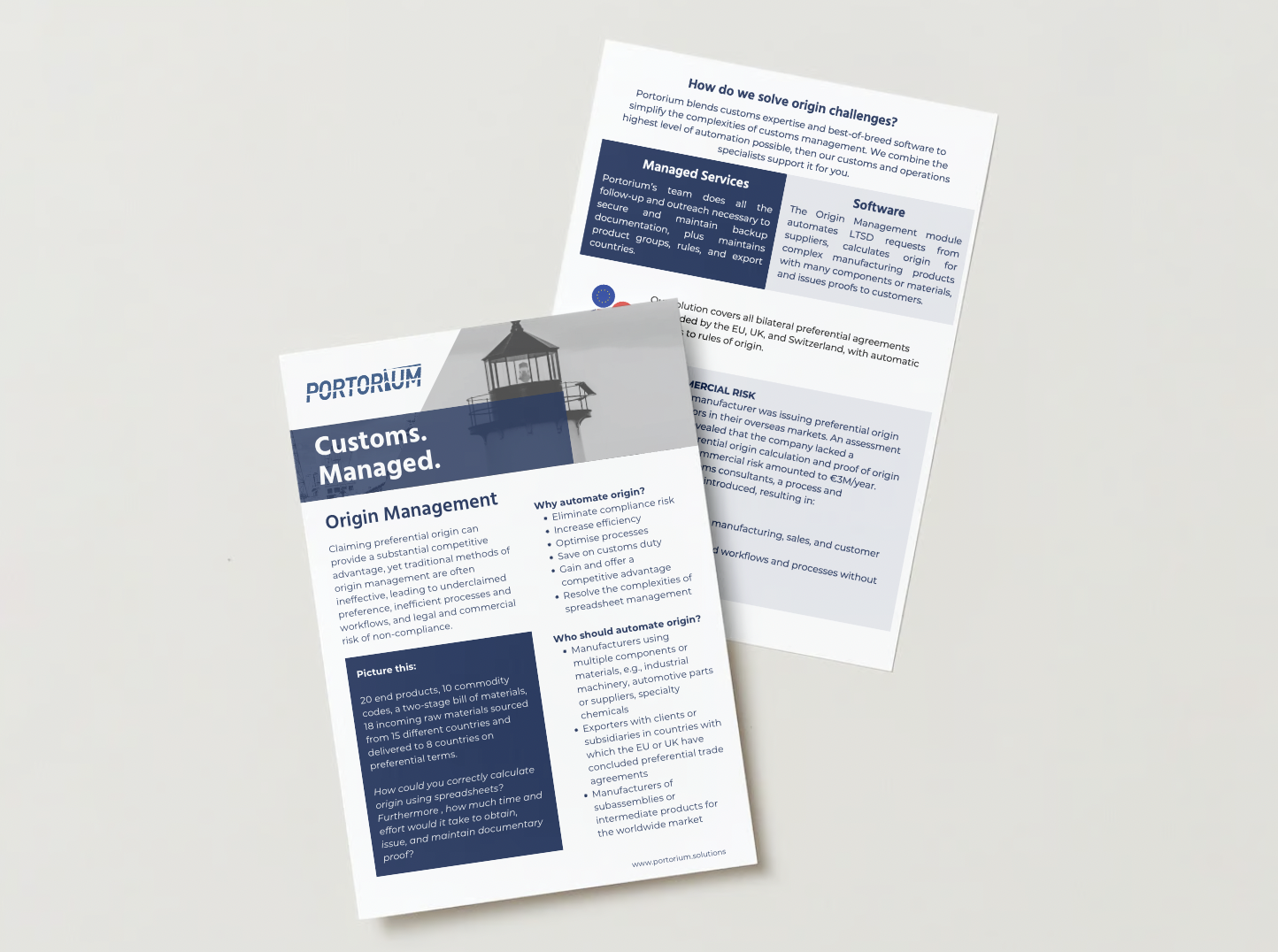Portorium is now a part of AEB
Origin Management
Gain efficiency, accuracy, and cost savings
![]()
Take full advantage of preferential agreements and ensure that you can provide the backup documentation required by customs authorities to claim preference. Portorium automates and supports the collection, calculation, and issuing of proof of origin documentation, keeping it current and accurate.
Why automate origin?
- Eliminate compliance risk
- Increase efficiency
- Optimise processes
- Save on customs duty
- Gain and offer a competitive advantage
- Resolve the complexities of spreadsheet management
Origin Management Made Simple
Many companies struggle to produce compliant proofs of origin. Traditional methods of collecting documentation from suppliers, calculating origin of complex products with numerous components or ingredients, and consistently issuing proofs to customers are resource intensive and error prone. Watch this short, 90-second video to learn how you can adopt a more efficient process for origin management.
Use case: Reinstating compliance
A large European building paints manufacturer was claiming preference and issuing Long Term Supplier Declarations (LTSDs) to its clients for thousands of materials. Underlying proof of origin was based on complicated and labour-intensive spreadsheets, not guaranteeing 100% accuracy. With daily shipments to Switzerland and hundreds of clients requesting proof of preferential EU origin, the compliance risk was significant.
Results:
- 51,353 materials assessed
- 1,902 supplier declarations issued/received
- Confidence in calculations
- Eliminated search and calculation time

Say goodbye to spreadsheets
Claim the preference you're entitled to and keep your proofs of origin current with Portorium.

Use case: Cutting commercial risk
This precision cutting blade manufacturer was issuing preferential origin statements for their distributors in their overseas markets. An assessment by our customs consultants revealed that the company lacked a substantiated process for preferential origin calculation and proof of origin management. The estimated commercial risk amounted to €3M/year. Following the advice of our customs consultants, a process and automated origin calculation was introduced, resulting in:
- Mitigated compliance risk
- Internal alignment with sourcing, manufacturing, sales, and customer service departments
- Increased efficiency with automated workflows and processes without adding headcount
Automating Origin Management with Portorium
Sure, automating origin management sounds great in theory, but how does it work in practice? This 2.5 minute video will show you how you can produce compliant proofs of origin efficiently and without the headaches by automating the three most challenging tasks: Collect, Calculate, and Issue.
Use case: A new spin on origin
This manufacturer of industrial components managed preferential origin calculation with static defaulted values, resulting in suboptimal origin determination and thus underclaiming preference. After an assessment by our customs consultants and the implementation of a fine-tuned origin management system, the company:
- Installed a comprehensive proof of origin and preference calculation process
- Gained a competitive advantage by allowing importers to claim preference
- Gained €6 million in bottom-line savings per year

How it works
Discovery
Together with your team, we will identify the scope of products, legal entities, companies and production plants, source, and sales regions relevant for origin determination in order to properly configure and onboard your project. The outcome is an aligned blueprint and project plan.
Onboarding
Portorium’s customs experts are familiar with the complexities of origin management, including the HS Nomenclature and concepts like cumulation, tolerances, principle of territoriality, no drawback rules, and direct transport rules. We configure the software settings to correspond with the information gathered in discovery, then work through the integration specifications with your team, set up the test environment, and run tests based on real-world scenarios. The outcome is a fully tested solution ready for go-live.
Day-to-day
We reach out to your suppliers to obtain long-term supplier declarations (LTSDs) as proof of preferential origin. We then send a link for suppliers to upload the LTSD to the origin management software via the supplier portal, following up when necessary.
When a new supplier is added, new items are provided by an existing supplier, or the LTSD is approaching its end date, our team follows up to make sure new statements are uploaded and maintained in the origin management software.
The solution uses the proofs of origin along with your goods receipts, purchase orders, sales orders, and bills of material to automatically determine the correct preference rule and calculation. The preparation of the data for calculation and the calculation itself can be automated up to 100 percent.
Software solution
- Calculates preferential origin
- Calculates minimum sales prices
- Up-to-date rules of origin included
- Process for requesting, managing, and issuing supplier’s declarations
- Automated deadline monitoring
- Integrates into your processes and data structures
Managed services
- Monitor requests for proof of origin and long-term supplier declarations
- Reach out to suppliers for LTSD requests
- Maintain configuration settings for specific rules
- Adapt configuration for new product groups
- Validate calculations
-
Issue supplier declarations
Coverage

One of the most effective ways to combat rising customs duties is by taking advantage of preferential origin allowed through free trade agreements. But that’s easier said than done. Tune into this recorded podcast from the Customs Knowledge Institute, Proving Preferential Origin in EU and UK. Portorium CEO Pieter Haesaert joins Claudia Romanita Stroe and Anthony Buckley to discuss:
- Problems surrounding proving preferential origin
- How customs authorities in the EU and UK implement the rules of origin requirements
- How businesses can prepare for the contingent liabilities associated with customs audits on past imports
- Ways forward
Do you have proof?
Portorium's assessments identify areas of risk and opportunity so you can make preference work in your favour.



